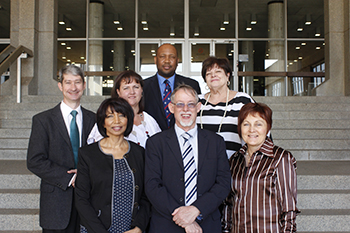Latest News Archive
Please select Category, Year, and then Month to display items
19 November 2018
|
Story Charlene Stanley
|
Photo Charlene Stanley
 Prof John Mubangizi, Dean of the Faculty of Law, encouraged delegates at the Fifth Annual International Mercantile Conference to share ideas on best international practice in their various fields.
Prof John Mubangizi, Dean of the Faculty of Law, encouraged delegates at the Fifth Annual International Mercantile Conference to share ideas on best international practice in their various fields.
“Don’t say anything online that you wouldn’t want plastered on a billboard with your face on it.”
This famous quote by international tech expert Erin Bury should be a guiding light when it comes to online habits in the workplace, according to Francois Cilliers, UFS Lecturer in Mercantile Law.
In his presentation Could Social Media be the Gateway to Employment Discrimination? he warned that employees have a responsibility not to bring their employers in disrepute through their comments on social media.
“Posts, updates, tweets, and comments are considered to be publications and can therefore never be seen as privileged information,” he explained.
Responsibility on employees and employers alike
He pointed out that employers also had a responsibility regarding the way in which they use the information about prospective employees obtained via social media.
“Nowadays, approximately 75% of companies hire through social media. In the US, recruiting companies spend hours researching candidates, making full use of what they can find on social media. It was found that 50–80% of employers frowned upon posts and pictures featuring drug and alcohol abuse, profanity, and bad grammar.”
He warned that employers needed to tread lightly, as a decision not to employ someone as a result of information on the prospective employee’s political views and sexual orientation could constitute unfair discrimination as set out in the Employment Equity Act.
“An employer who wishes to use a screening process (utilising social media) has to prove that the information and the process is objectively necessary and can be justified with reference to the inherent requirements of the job,” he explained.
“As technology and electronic systems advance, so too should the applicable labour laws.”
Cilliers’ presentation formed part of the Fifth Annual International Mercantile Law Conference recently hosted by the Faculty of Law on the Bloemfontein Campus.
Incorporating new technology in teaching and research
“This conference is an opportunity to share ideas on best practice in what is perceived as a ‘difficult’ field within Law,” said Prof John Mubangizi, Dean of the Faculty of Law, as he opened the proceedings. Topics in the discussion sessions ranged from Racism in the workplace and The underrepresentation of females in the judiciary, to Decriminalisation of cannabis: A recipe for healthy employer-employee relations?
“Conferences such as these help us to take advantage of the newest developments in technology to advance our teaching and research,” said Prof Mubangizi.
“To quote Einstein: ‘We can’t solve problems by using the same kind of thinking we used when we created them.’”
New schools, restructuring part of streamlined Faculty of Health Sciences
2017-10-12

From the left, front are: Dr Jocelyn Naicker,
Prof Gert van Zyl, Prof Magda Mulder;
back from left: Prof Chris Viljoen,
Marlene Viljoen, Deputy Director: Faculty of Health Sciences;
Prof Nathaniel Mofolo; and Prof Santie van Vuuren.
Photo: Rulanzen Martin
Numerous developments, such as the creation of two new schools and one newly restructured School of Medicine in the Faculty of Health Sciences at the University of the Free State (UFS), will catapult this renowned faculty to even greater heights.
Five-school structure to increase access
A five-school structure was proposed at the annual Faculty Management retreat in July 2016. The previous three-school model included the Schools of Medicine, Nursing, and Allied Health Professions.
The current School of Medicine has been restructured and will henceforth be known as the School of Clinical Medicine. The Schools of Pathology and Biomedical Sciences have been added to the faculty. “So, three new schools were in fact created within the faculty,” said Prof Gert van Zyl, Dean of the faculty.
“There was also a request from the National Health Laboratory Services to group academics that is rendering services in pathology into a new School of Pathology.” This is what motivated the faculty management to create two new schools.
Esteemed academics appointed
With the creation of the new schools, there were also new appointments within the Faculty of Health Sciences. Dr Jocelyn Naicker has been appointed as the new part-time Head of the School of Pathology, Prof Chris Viljoen was appointed as the part-time Head of the School of Biomedical Sciences, and Prof Nathaniel Mofolo as the new Head of the School of Clinical Medicine. Prof Santie van Vuuren remains Head of the School of Allied Health Professions, and Prof Magda Mulder as the head of the School of Nursing.
Research outputs to remain as usual
The addition of the new schools will not impact research output. “In the past, research was done across departmental boundaries between all the departments in the faculty,” Prof Van Zyl said. The advantages of adding two additional schools are that the workload will be distributed among the five schools. The heads of schools will work within their respective disciplines and related areas, and will eliminate the duplication of administrative functions.